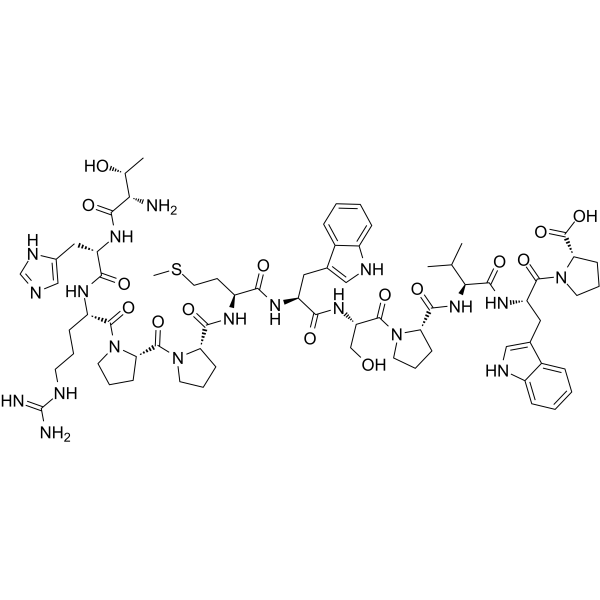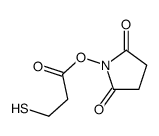 To enhance service speed and avoid tariff delays, we've opened a US warehouse. All US orders ship directly from our US facility.
To enhance service speed and avoid tariff delays, we've opened a US warehouse. All US orders ship directly from our US facility.
| Cat. No. | Product Name | Field of Application | Chemical Structure |
|---|---|---|---|
| DC72141 | Cefroxadine |
Cefroxadine (CGP 9000) is an orally active cephalosporin antibiotic. Cefroxadine is more effective than cephalexin against Escherichia coli and Klebsiella pneumoniae with MIC values of 3.13 and 1.56 μg/mL respectively with a concentration of 106 μg/mL. Cefroxadine can be used for the research of infection.
More description
|

|
| DC72140 | Megazol |
Megazol is an orally active antibacterial agent. Megazol has effective inhibitory against T. b. brueei with an EC50 of 0.01 μg/mL. Megazol can be used for the research of protozoan infections.
More description
|

|
| DC72139 | (R)-(-)-α-Phellandrene |
(R)-(-)-α-Phellandrene ((-)-α-Phellandrene) is an the (R)-(-)-stereoisomer of α-phellandrene. α-phellandrene is an orally active cyclic monoterpene that attenuates inflammatory response, and induces DNA damage.
More description
|

|
| DC72138 | Azidocillin |
Azidocillin, a semi-synthetic Penicillin, is an orally active β-lactam antibiotic. Azidocillin bears an azide functionality and retains on-target activity within bacteria. Azidocillin can be used to research osteitis caused by dental surgery, otitis media, enterococcal septicemia and other bacterial infectious diseases.
More description
|

|
| DC72137 | MRV03-037 |
MRV03-037 is a selective colibactin-activated peptidase (ClbP) inhibitor that blocks the genotoxic effect of Colibactin on eukaryotic cells. MRV03-037 prevents gut bacterial genotoxin production.
More description
|

|
| DC72136 | Nifurtoinol |
Nifurtoinol is a nitrofuran-derivative antibiotic with antibacterial effects. Nifurtoinol can be used for the research of urinary tract infections.
More description
|

|
| DC72135 | Penamecillin |
Penamecillin (Wy 20788) an acetoxymethyl ester of Penicillin G. Penamecillin is an orally active antibacterial agent.
More description
|

|
| DC72134 | Forigerimod |
Forigerimod (IPP-201101) is a CD4 T-cell modulator. Forigerimod is a 21-amino-acid fragment of U1 small nuclear ribonucleoprotein 70 kDa that is phosphorylated at Ser140. Forigerimod can potently inhibit autophagy. Forigerimod can be used for the research of autoimmune disorders, such as systemic lupus erythematosus (SLE) .
More description
|

|
| DC70702 | PLX8394 Featured |
PLX8394 (PLX-8394) is a next-generation, orally available, small-molecule BRAF inhibitor with IC50 values of 3.8 nM, 14 nM and 23 nM for BRAF (V600E), WT BRAF and CRAF, respectively.PLX8394 suppresses mutant BRAF cells without activating the MAPK pathway in cells bearing upstream activation, overcame several known mechanisms of resistance to first-generation RAF inhibitors.PLX8394 inhibits ERK signaling by specifically disrupting BRAF-containing dimers, including BRAF homodimers and BRAF-CRAF heterodimers, but not CRAF homodimers or ARAF-containing dimers.As a BRAF-specific dimer breaker, PLX8394 selectively inhibits ERK signaling in tumors driven by dimeric BRAF mutants, including BRAF fusions and splice variants as well as BRAF V600 monomers, but spares RAF function in normal cells in which CRAF homodimers can drive signaling.
More description
|

|
| DC60313 | UT-34 Featured |
UT-34 is a potent, selective and orally active second-generation pan-androgen receptor (AR) antagonist and degrader with IC50s of 211.7 nM, 262.4 nM and 215.7 nM for wild-type, F876L and W741L AR, respectively. UT-34 binds to ligand-binding domain (LBD) and function-1 (AF-1) domains and requires ubiquitin proteasome pathway to degrade the AR. UT-34 has anti-prostate cancer efficacy[1][2].
More description
|

|
| DC41895 | TfR-T12 Featured |
TfR-T12 is a BBB-penetrated transferrin receptor (TfR) binding peptide, displaying a binding affinity in the nM range[1][2].
More description
|

|
| DC60299 | 2-chloroprop-2-en-1-amine;hydrochloride Featured |

|
|
| DC46844 | Emraclidine Featured |
Emraclidine is a muscarinic M4 receptor positive allosteric modulator (WO2018002760, compound 11). Emraclidine can be used for the research of neurological diseases.
More description
|

|
| DC40841 | 3-Mercaptopropionic acid NHS ester Featured |
3-Mercaptopropanyl-N-hydroxysuccinimide ester is an alkyl/ether-based PROTAC linker that can be used in the synthesis of PROTACs.
More description
|

|
| DC40956 | β-catenin-IN-2 Featured |
β-catenin-IN-2 is a potent β-catenin inhibitor, compound H1B1, extracted from patent US20150374662A1. β-catenin-IN-2 can be used for the study of colorectal cancer.
More description
|

|
| DC20386 | Pioglitazone Featured |
Pioglitazone is a potent and selective PPARγ agonist with high affinity binding to the PPARγ ligand-binding domain with EC50 of 0.93 and 0.99 μM for human and mouse PPARγ, respectively.
More description
|

|
| DC40101 | Phenamil methanesulfonate |
Phenamil methanesulfonate, an analog of Amiloride, is a more potent and less reversible epithelial sodium channel (ENaC) blocker with an IC50 of 400 nM. Phenamil methanesulfonate is also a competive inhibitor of TRPP3 and inhibits TRPP3-mediated Ca2+ transport with an IC50 of 140 nM in a Ca2+ uptake assay. Phenamil methanesulfonate is an intriguing small molecule to promote bone repair by strongly activating BMP signaling pathway. Phenamil methanesulfonate is used for the research of cystic fibrosis lung disease.
More description
|

|
| DC41416 | 13-Hydroxyisobakuchiol |
Hydroxyisobakuchiol (Delta3,2-Hydroxylbakuchiol), an analog of Bakuchiol isolated from Psoralea corylifolia (L.), is a potent monoamine transporter inhibitor. 13-Hydroxyisobakuchiol is more selective for the dopamine transporter (DAT) (IC50=0.58 μM) and norepinephrine transporter (NET) (IC50=0.69 μM) than for the serotonin transporter (SERT) (IC50=312.02 μM). 13-Hydroxyisobakuchiol has the potential for the research of disorders such as Parkinson's disease, depression, and cocaine addiction.
More description
|

|
| DC46288 | Dronedarone D6 hydrochloride |
Dronedarone D6 hydrochloride is the deuterium labeled Dronedarone. Dronedarone hydrochloride, a derivative of Amiodarone, is a class III antiarrhythmic agent for the study of atrial fibrillation (AF) and atrial flutter. Dronedarone hydrochloride is a potent blocker of multiple ion currents, including potassium current, sodium current, and L-type calcium current, and exhibits antiadrenergic effects by noncompetitive binding to β-adrenergic receptors. Dronedarone hydrochloride is a substrate for and a moderate inhibitor of CYP3A4.
More description
|

|
| DC45802 | TD52 |
TD52, an Erlotinib derivative, is an orally active, potent cancerous inhibitor of protein phosphatase 2A (CIP2A) inhibitor. TD52 mediates the apoptotic effect in triple-negative breast cancer (TNBC) cells via regulating the CIP2A/PP2A/p-Akt signalling pathway. TD52 indirectly reduced CIP2A by disturbing Elk1 binding to the CIP2A promoter. TD52 has less p-EGFR inhibition and has potent anti-cancer activity.
More description
|

|
| DC41901 | Tat-NR2Baa TFA |
Tat-NR2BAA TFA is the control peptide of Tat-NR2B9c, inactive. The sequence of Tat-NR2BAA TFA is similar to Tat-NR2B9c, but it has a double-point mutation in the COOH terminal tSXV motif, making it incapable of binding PSD-95. Tat-NR2B9c is a membrane-permeant peptide and disrupts PSD-95/NMDAR binding, correlate with uncoupling NR2B- and/or NR2A-type NMDARs from PSD-95.
More description
|

|
| DC41900 | Tat-NR2Baa |
Tat-NR2BAA is the control peptide of Tat-NR2B9c, inactive. The sequence of Tat-NR2BAA is similar to Tat-NR2B9c, but it has a double-point mutation in the COOH terminal tSXV motif, making it incapable of binding PSD-95. Tat-NR2B9c is a membrane-permeant peptide and disrupts PSD-95/NMDAR binding, correlate with uncoupling NR2B- and/or NR2A-type NMDARs from PSD-95.
More description
|

|
| DC46413 | DPNB-ABT594 |
DPNB-ABT594 is a nitrobenzyl-caged ABT594 and activates nAChRs containing the α4β2 subunits with good selectivity than the α7 subunit. DPNB-ABT594 can be used to map the distribution of nAChRs on neurons of the medial habenula (MHb) and helps to gain a deeper understanding of the nAChR‐mediated Ca2+ signalling in the MHb.
More description
|

|
| DC49139 | OAB-14 |
OAB-14, is a Bexarotene derivative, improves Alzheimer's disease-related pathologies and cognitive impairments by increasing β-amyloid clearance in APP/PS1 mice. OAB-14 effectively ameliorates the dysfunction of the endosomal-autophagic-lysosomal pathway in APP/PS1 transgenic mice.
More description
|

|
| DC40779 | NHC-diphosphate |
NHC-diphosphate is an active phosphorylated intracellular metabolite of β-d-N4-Hydroxycytidine (NHC) as a diphosphate form. NHC is a pyrimidine ribonucleoside and behaves as a potent anti-virus agent. NHC effectively inhibits the replication of venezuelan equine encephalitis virus (VEEV), Chikungunya virus (CHIKV) and hepatitis C virus (HCV).
More description
|

|
| DC40074 | Nebentan potassium |
Nebentan potassium (YM598) is a potent, selective and orally active non-peptide endothelin ETA receptor antagonist through the modification of Bosentan. Nebentan potassium inhibits [125I] endothelin-1 binding to cloned human endothelin ETA and ETB receptor, with Ki of 0.697 nM and 569 nM, respectively. YM598 can ameliorate the progression of cor pulmonale and myocardial infarction in vivo.
More description
|

|
| DC41662 | PG-931 TFA |
PG-931 TFA, an analog of SHU 9119, is a potent melanocortin 4 (MC4) receptor (IC50=0.58 nM) agonist and is more selective than for the hMC3R (IC50=55 nM) or the hMC5R(IC50=2.4 nM). PG-931 TFA can reverse haemorrhagic shock and prevent multiple organ damage in vivo.
More description
|

|
| DC40073 | Nebentan |
Nebentan (YM598 free base) is a potent, selective and orally active non-peptide endothelin ETA receptor antagonist through the modification of Bosentan. Nebentan inhibits [125I] endothelin-1 binding to cloned human endothelin ETA and ETB receptor, with Ki of 0.697 nM and 569 nM, respectively. YM598 can ameliorate the progression of cor pulmonale and myocardial infarction in vivo.
More description
|

|
| DC40890 | 21-Acetoxypregna-1,4,9(11),16-tetraene-3,20-dione |
21-Acetoxypregna-1,4,9(11),16-tetraene-3,20-dione is an intermediate of delta 9,11 steroids synthesis, for example, Vamorolone. The delta 9,11 steroids are modifications of glucocorticoids and has anti-inflammatory properties. The delta 9,11 steroids are agents for protection against cell damage (lipid peroxidation) and inhibition of neovascularization.
More description
|

|
| DC41661 | PG-931 |
PG-931, an analog of SHU 9119, is a potent melanocortin 4 (MC4) receptor (IC50=0.58 nM) agonist and is more selective than for the hMC3R (IC50=55 nM) or the hMC5R (IC50=2.4 nM). PG-931 can reverse haemorrhagic shock and prevent multiple organ damage in vivo.
More description
|

|